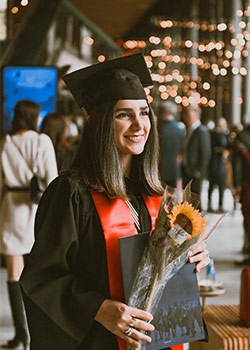Wittenborg Online News!
Employability Skills of International Graduates Analysed in MBM Thesis
Employability Skills of International Graduates Analysed in MBM Thesis
Employability Skills of International Graduates Analysed in MBM Thesis

Sophia Faraji’s Study Highlights Talents Brought by Internationals to the Netherlands
Wittenborg’s External Relations & Events Coordinator, Sophia Faraji, recently reached a new milestone in her career by completing an MBM degree in Digital Marketing and Communication at the school.
Based on her professional and personal trajectory, Faraji decided to focus her thesis research on the employability skills and abilities of international graduates from universities of applied sciences in the Netherlands.
“As someone working in the External Relations Department at Wittenborg, my primary responsibility is to facilitate interactions between the institution and the broader community. One crucial aspect of this role is to ensure that our international graduates possess the necessary skills and abilities to succeed in the job market, both within the Netherlands and globally. By researching this topic, I aimed to gain a comprehensive understanding of the specific employability needs and challenges faced by our international graduates,” she highlights.
Originally from Iran, Faraji adds that during her trajectory as a student and professional in the Netherlands she has observed the diverse talents and perspectives that international graduates bring to the country's workforce. “It is crucial to harness this potential fully, as it not only benefits the individuals themselves but also contributes to the growth and development of the Dutch economy and society as a whole. Understanding the underlying factors that influence the employability of international graduates will enable me to advocate for targeted support measures and promote a more inclusive and supportive environment within the school and beyond.”
To conduct her study, the researcher employed a qualitative research method, based on interviews with various stakeholders. In total, she interviewed 20 stakeholders, including nine international graduates, seven universities of applied sciences and four companies.
Faraji points out that approaching and engaging with her interviewees posed a unique set of difficulties. She implemented several strategies to overcome these challenges and ensure the successful completion of her research. “For instance, I started by establishing strong relationships with key contacts in higher education institutions and companies. I reached out to relevant departments and explained the significance of the research and its potential benefits to the stakeholders. Coordinating interviews with multiple stakeholders can be challenging, considering their busy schedules and diverse time zones. To address this, I offered flexible scheduling options, including virtual interviews to accommodate to their availability.”
Faraji’s research concludes that international graduates demonstrate strong cross-cultural communication skills, including proficiency in multiple languages, adaptability to diverse work environments and the ability to effectively collaborate with colleagues from different cultural backgrounds. The study underlines that employers highly value these skills as they foster teamwork and international partnerships.
“Furthermore, what is emphasised by both higher education institutions and the industry is that building and maintaining professional networks enhances the employability prospects of international graduates. Excellent critical thinking and problem-solving skills are highlighted by employers as abilities that graduates are expected to build up in themselves,” she stresses.
WUP 23/8/2023
by Ulisses Sawczuk
©WUAS Press
518 words